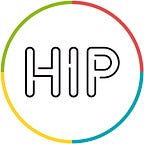Q & A with HIP Alumni and Board Member Daniel Castan
3 min readDec 14, 2021
Daniel Castan was one of HIP’s very first peer health educators (PHEs), from 2009–2011, when he was at Palmetto High School. Dan is now a member of HIP’s Board of Directors. He currently lives in New York and works for the Blackstone Group. Hear from Dan about his HIP connection, from peer educator to board member, and why he has remained involved for over a decade.
- Why did you join HIP? I noticed a gap in health education at school and saw HIP as an efficient, positive way to address those issues. The approach was unlike anything I had seen previously and made a ton of sense for high schoolers. I was also interested in getting a better health education myself, since I had never taken a health ed. class before.
- How do you think HIP impacted the 9th graders at your school? I think 9th graders became more comfortable addressing mental and physical health issues they were having. Additionally, they gained access to helpful resources through the HIP portal.
- How did HIP impact you as a PHE while you were in high school? HIP increased my awareness about what other students may be going through, which made me more empathetic.
- What skills did you learn in HIP and how have you used those skills? HIP definitely helped my public speaking, professional and organizational skills. PHEs are given a lot of autonomy and need to stay focused, organized and responsible.
- Do you have a particular story/memory/anecdote from your involvement in HIP? One of my best friends suffered physical and sexual abuse from her partner in her sophomore year. I didn’t fully appreciate the gravity of what was going on at first, but after completing the HIP training my junior year, I was able to approach her about the best course of action.
- How has HIP impacted you since high school? I’ve become more confident addressing uncomfortable issues and being open-minded. I’ve learned how to communicate with different types of people and help others cope with personal issues.
- Why did you decide to remain involved with HIP for the past 10 years? I knew HIP had the potential to affect thousands of students beyond the pilot program. It’s an efficient, scalable way to address health issues which are becoming more relevant. I’ve always been impressed by the innovation behind the peer-to-peer model and the relevance of the curriculum to modern-day high schoolers.
- You were part of the first two pilot years of HIP. How would you describe HIP’s growth/evolution since then? HIP has definitely become a lot more data driven, which helps refine and improve the approach. The partnership with Penn ImpactEd has been vital toward refining the curriculum and making sure kids’ voices are heard.
- Why did you join the board? I recognize that my experience as a PHE is vital toward helping influence board decisions and ultimately expand HIP across the country.
- Why do you believe HIP should grow to more schools/cities throughout the country? HIP’s model is about as scalable as it gets. The fact that retention rates are 100% proves that once we get our foot in the door, school board members appreciate the model and see it as an economical, efficient way to address the modern health crisis.
- What physical/mental health issues concern you the most? Why? Mental health, depression and anxiety definitely concern me the most. As someone who has suffered through high anxiety for most of his life, HIP has enlightened me as to the resources at hand to reduce my anxiety and tackle mental health issues.
- What are your goals/aspirations for HIP? I would love to see HIP become the dominant force behind high school health education across the country. It would be awesome to have a chapter in every state eventually, which I think is more than realistic.
